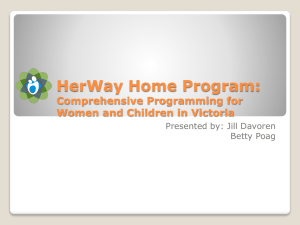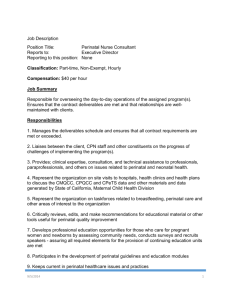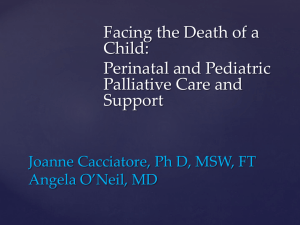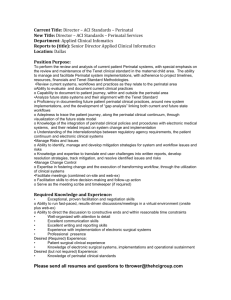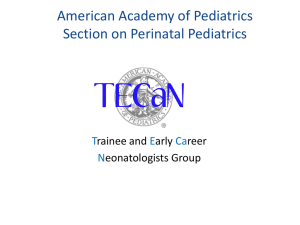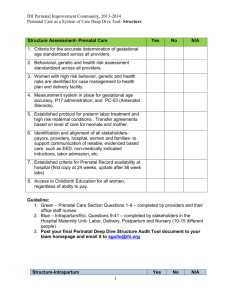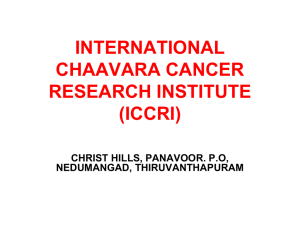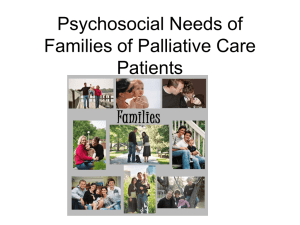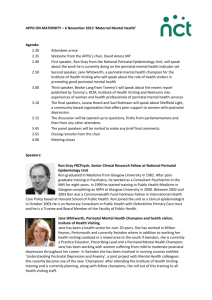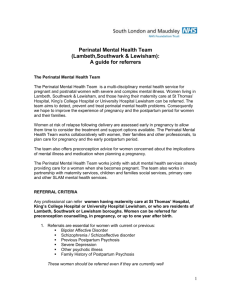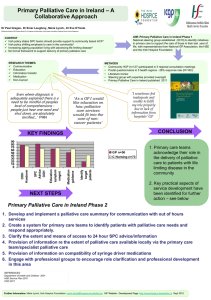Never Alone Perinatal Palliative Care Program
advertisement
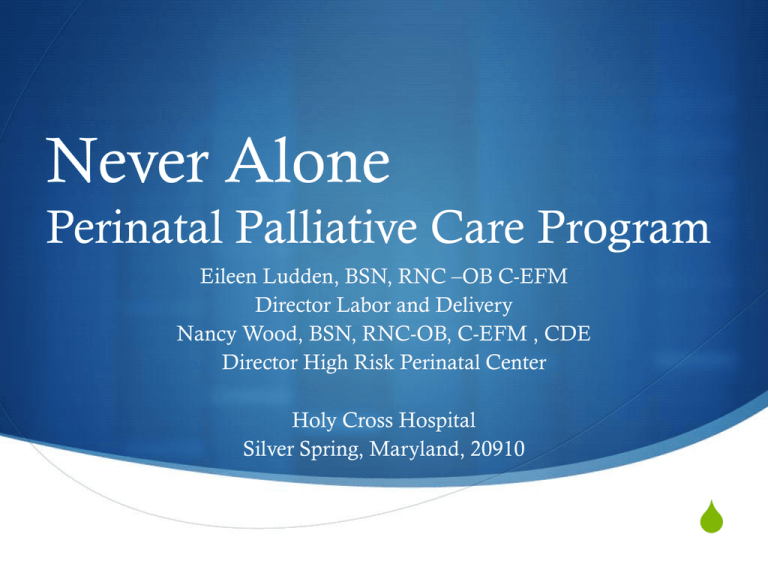
Never Alone Perinatal Palliative Care Program Eileen Ludden, BSN, RNC –OB C-EFM Director Labor and Delivery Nancy Wood, BSN, RNC-OB, C-EFM , CDE Director High Risk Perinatal Center Holy Cross Hospital Silver Spring, Maryland, 20910 S Mission S To be the most trusted healthcare provider in the area S To serve patients and their families who elect to carry a pregnancy to delivery in which a poor outcome is expected Prenatal Diagnosis Exists when a pregnant woman is determined to have a life-threatening or serious illness or when her unborn fetus is anticipated to be born with a life-limiting birth defect that will likely result in a neonatal death. Birth Defects S In the U.S. up to 20,000 infants are born annually with conditions that are considered incompatible with life beyond the first year S In the State of Maryland 1 in 6 births result in a birth defect What is Palliative Care? S Model of care that is holistic and extensive specifically for a patient who is not expected to “get better” S Planned intervention by trained interdisciplinary staff members who support the family and deliver care in an empathetic and sensitive manner S Goal is to prevent and relieve physical pain and suffering of the patient and to improve the conditions of living and dying S Focus is on the family as a unit, on preserving the dignity of life and helping to memorialize whatever brief time they may have together S A team approach to alleviate physical, psychological, social, emotional, and spiritual suffering Potential vs. Actual Referrals Of the forty patients in FY10 who were potential referrals to this program, zero referrals were received Problem Statement Patients with a prenatal diagnosis, medical staff, nursing staff and the community were not aware of the Perinatal Palliative Care Program Goal To educate the medical and nursing staff and community about the existence of the Never Alone Perinatal Palliative Care Program Why does this matter? S With advanced planning, patient’s wishes for their delivery and the care of their baby are addressed S Decreases stress on the patient, family, and staff S Staff is better able to support the family when there is a plan of care Process Metrics & Baseline Measures S Number of referrals S Pre & post implementation knowledge surveys S Zero referrals in Fiscal Year 2010 S A pre-implementation survey of the medical and nursing staff indicated only 33% had any knowledge of the existing Perinatal Palliative Care Program Pre-Implementation Knowledge Survey – December 2010 Are you aware of the Perinatal Palliative Care Program? 67% Yes 33% No Identified Problems S Knowledge deficit S No single phone number to call to enter patient into program S No intake sheet to get information regarding patient’s diagnosis S No marketing of the program Action Plan After survey results were reviewed, education opportunities were provided S OB/GYN Dept. Meeting S Staff Meetings S Fact sheet for physician offices S Brochure for patients and physician offices S Community Outreach-Isaiah’s Promise and Archdiocese of Washington, DC Summary of Improvement S Identity of the program occurred through name recognition S Education-staff meetings & department meetings S Development & Implementation S Patient brochure S Fact sheet for the physicians S Intake Information Sheet S A sample birth plan S Re-educate on the Perinatal Alerts Binder S Community Outreach-Isaiah’s Promise, Archdiocese of Washington, DC Post Implementation Survey Are you aware of the Never Alone Perinatal Palliative Care Program? 18% 82% Yes No The Never Alone Program is not about Finances S Revenue to HCH for a routine Mother Baby stay of 2-3 days averages $5,000 for the mother and $1,000 for the baby S Revenue for a NICU 5 day stay averages $8,800 S “Revenue” or potential benefit to the patient who has the support of the Never Alone program is PRICELESS!!! S Families will partner with us for their future health care needs and may refer others to us because of the care and support that they received Challenges S Large number of physician groups and multidisciplinary staff to educate about program S Communication of patient’s plan of care to their physician, neonatology and nursing departments S Program Identity Change Management S Marketing-competing agendas with other areas of the hospital and the new hospital S Develop relationships with other departments and the community S It is not easy!!! Make sure you communicate effectively Lessons Learned S Communication is vital to the success of any program S Increased knowledge base in regards to the development of a brochure S Importance of “branding” and name recognition S Be prepared for the plan of care to change Miles Emmanuel April 23, 2011- April 24, 2011 But Jesus called them to him, saying, “Let the children come to me, and do not hinder them, for to such belongs the kingdom of God.” –Luke 18:16

